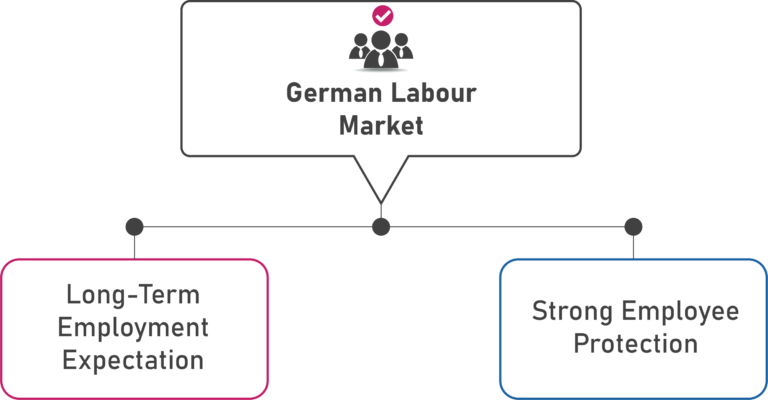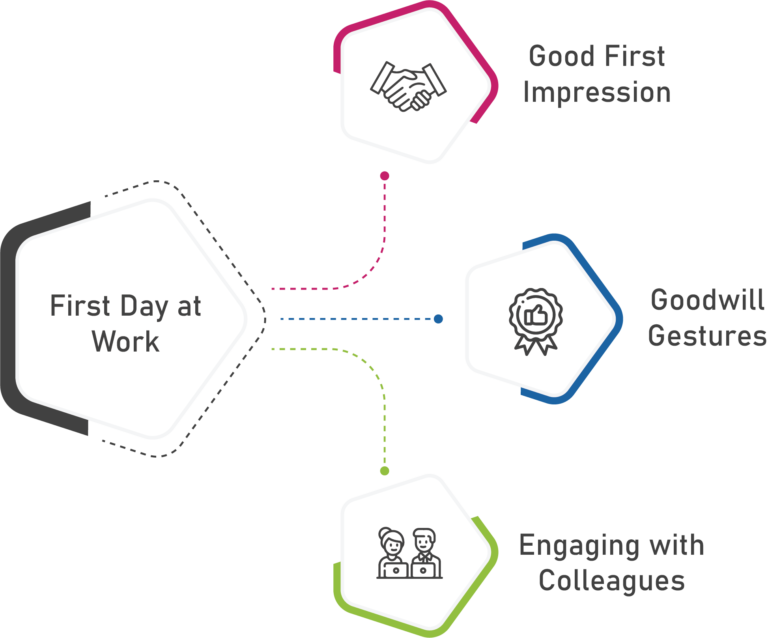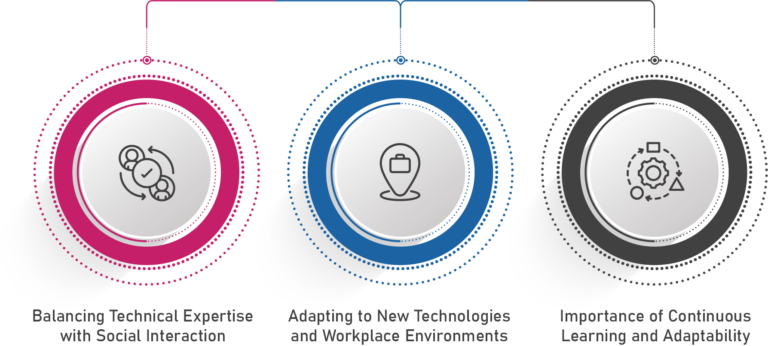7 Tips to Help You Succeed in the first 30 days in a new job in Germany.
Congratulations on reaching this pivotal point in your career! You’ve already gotten 95% of the way there, in terms of establishing a career in Germany’s IT sector. This achievement demonstrates your abilities and potential, which have been recognized by your new employer. As you move forward, take advantage of opportunities to integrate into the team through social activities, and be proactive in seeking feedback to enhance your performance. Embracing the balance between personal and professional life in Germany value is crucial, ensuring efficiency during work hours while respecting personal time. This immersive approach in the first 30 days in a new job in Germany sets a solid foundation for a successful and fulfilling professional journey in Germany.
In Germany, the probation period, which typically lasts first 90 days in a new job in Germany, is an important time for mutual evaluation between you and your employer. While it provides an opportunity to demonstrate your skills and adapt to a new work environment, it also has risks. Employment can be terminated with less difficulty during this period than after probation. German workplaces often value precision and efficiency, so paying attention to detail and demonstrating a strong work ethic is crucial. Additionally, utilizing this first week at new job in Germany to familiarize oneself with company processes and procedures sets the stage for a seamless integration into the team and a successful professional journey in Germany.
First 30 days in a new job in Germany is about Adapting to German work culture:
The German labor market, particularly for IT professionals, is characterized by:
- Long-term Employment Expectations: Companies in Germany frequently seek candidates who are interested in long-term employment. Understanding this mindset is critical because it influences how you approach your work, interact with others, and plan your career’s trajectory.
- Strong employee protection legislation Post-Probation: German labor law offers strong protections for employees, but these typically come into full effect after the probation period. During this initial period, which can last up to six months, employment is more precarious. Employers have the flexibility to terminate employment within this timeframe with a shorter notice period, often just two weeks. This contrasts with the post-probation period, where terminating an employment relationship becomes significantly more challenging for employers, requiring substantial reasons. The probation period thus emerges as a crucial phase for employees to demonstrate their suitability and align with the company’s expectations.

How to prepare for your first day at a new job in Germany:
Your first day in a new position is critical, especially in the IT sector in Germany. Here are some tips to help you make the most of it:
- Making a Good First Impression: The first impression you make sets the tone for the rest of your employment. Proactively demonstrate excitement and a genuine interest in the company’s operations and culture. This approach shows that you are willing to integrate and participate.
- Goodwill gestures: Small acts can have a big impact. Bringing something unique from your home country, such as sweets or snacks, can be a welcoming gesture to your new team. It not only helps to break the ice, but it also provides insight into your cultural background.
- Engaging with Colleagues: Take the initiative to learn about your colleagues’ names, roles, and interests. This not only helps in building rapport but also shows your commitment to being a part of the team. Demonstrating care and interest in your colleagues is an effective way to establish strong working relationships from the start.
These steps are crucial in laying a solid foundation for your new journey in Germany’s IT industry, ensuring a smooth and successful integration into your new workplace.

Building Relationships and Cultural Integration
Integrating into a new professional Germany culture, particularly in the IT sector in Germany, involves understanding and adapting to specific cultural nuances. Here are focused insights on building relationships and cultural integration:
- Importance of Cultural Gestures in the Workplace: In Germany, sharing personal cultural elements, like unique food items, is highly appreciated. For example, if there’s a barbecue or a team event, bringing a dish from your home country can be a great way to engage with colleagues. This practice not only piques curiosity but also demonstrates respect for diversity and an eagerness to share your background.
- Navigating and Adapting to Cultural Nuances: It’s important to observe and participate in common workplace practices. In professional Germany culture, for instance, if someone has a birthday, they might bring a cake for colleagues. Emulating such gestures shows your willingness to build relationships.
- German directness: Additionally, understanding the directness in communication, especially feedback, is crucial. In Germany, straightforward communication is often a sign of respect and a way to foster clear and efficient teamwork.
Engaging in these cultural practices helps in building strong relationships with your colleagues, demonstrating not only your adaptability but also your respect for the work culture in Germany.
Feedback and Communication
In the context of working in Germany, especially in the IT and software engineering fields, understanding and adapting to the communication style is crucial. The following elaborates on the notion of specific guidance on feedback and communication:
- The Value of Open Communication and Feedback: It’s emphasized that expressing openness to critical feedback and suggestions is vital. When introducing yourself, it’s beneficial to invite feedback directly. This approach not only demonstrates your willingness to improve but also encourages a culture of open and honest communication.
- Cultural Perspective on Direct Feedback in Germany: In Germany, direct feedback is often a norm and is considered a form of respect. It’s important to understand that when colleagues provide straightforward feedback, it’s not out of disrespect but rather a care for you to succeed. This directness is a key aspect of professional Germany culture, and being receptive to it can significantly enhance your professional development.
- Positive Interpretation and Response to Feedback: Adopting a positive attitude towards feedback, even when it’s critical, is important. Viewing feedback as an opportunity for growth rather than a personal critique helps in building resilience and adaptability. It’s also crucial to actively seek clarification and ways to improve when receiving vague or general feedback.
Incorporating these communication strategies will help in navigating the German work environment more effectively, fostering better relationships with colleagues and enhancing your professional growth.

Technical and Social Skills Integration
Integrating technical skills with social interaction is a critical aspect of succeeding in Germany’s IT industry. Here are key points for effectively combining these skills:
- Balancing Technical Expertise with Social Interaction: It’s crucial to demonstrate not only your technical abilities but also your capability to work well with others. As the norm suggests, your colleagues’ perception of working with you can significantly impact your professional reputation. It’s important to be more than just technically proficient; being pleasant and cooperative in team settings can sometimes be valued even more than technical prowess alone.
- Adapting to New Technologies and Workplace Environments: Embrace new infrastructures and technologies that you might encounter in your new role. It is advised that you should be proactive in learning about the company’s technologies and infrastructure, which could include engaging with wikis or other documentation provided. This proactive approach to learning and adapting demonstrates your commitment to the role and your willingness to evolve with the company’s needs.
- Importance of Continuous Learning and Adaptability: In line with the advice above, positioning yourself as a continuous learner who can adapt to different situations is vital. Whether it’s taking on new technical challenges or being the first to implement certain technologies, showing that you are open to learning and evolving is key. Additionally, it’s suggested to be open to sharing your knowledge, which not only helps in building your personal brand but also contributes to the team’s collective growth.
Integrating these aspects into your professional approach will not only help you in adapting to your new role in Germany but also in establishing yourself as a valuable team member who contributes both technically and socially.

Socialization Outside the Company
For IT professionals in Germany, socialization outside of work is as crucial as professional conduct within the workplace, especially during the first 30 days in a new job in Germany:
- Engaging in Social Activities Outside of Work: The importance of engaging in activities go beyond the workplace to integrate into the broader community. It mentions joining clubs or associations, which are prevalent in Germany. These clubs offer a platform for various activities, from sports to cultural interests, providing opportunities to meet people with similar interests.
- The Role of Clubs and Associations in Germany: Germany is known for its unique club culture (‘Vereine’). Joining these clubs is not only a way to socialize but also an essential part of integrating into German society. Whether it’s a sports club, a photography group, or a volunteer organization, participating in these clubs can significantly aid in building a social network outside of your professional circle.
- Networking and Finding Common Ground with Others: Exploring opportunities to meet other expatriates and locals through these clubs. It is also important to mention the value of participating in local events and volunteer work, which can be especially beneficial in smaller communities. Engaging in these activities allows you to share experiences with others who might be facing similar challenges and to find a common ground in a new environment.
Engaging in social activities through clubs and associations is a vital part of adapting to life in Germany, offering both personal growth and a sense of community.

Long-term Onboarding Strategies
For professionals in the IT sector starting a new role in Germany, establishing a solid foundation in the initial months is crucial for long-term success. Here are some focused strategies:
- Strategies for Sustained Success and Integration: It’s important to continuously ask your boss and colleagues about what is expected and valued in your role. This can start even before you arrive in Germany, with some companies offering onboarding programs or materials to help familiarize you with the team and company culture. Engaging with these resources shows your commitment and helps to smooth your transition.
- Balancing Professional Responsibilities with Personal Life: It is important to prioritize your professional responsibilities, especially in the first few months. This may mean dedicating extra time outside of regular work hours to learn and adapt to your new role. However, it’s also important to gradually find a balance personal and professional life in Germany, ensuring that you don’t neglect your personal life and well-being in the long term.
- Importance of Establishing a Solid Foundation in the Initial Months: The initial months in your new job are about more than just proving your technical skills; they’re about integrating into the company culture and building relationships with your colleagues. Taking the time to learn the technologies and methodologies specific to your new workplace and showing a willingness to adapt and grow is key to establishing yourself as a reliable and valuable team member.
Implementing these strategies will help ensure that you not only succeed in your new role but also lay the groundwork for continued growth and satisfaction in your career in Germany.

Conclusion
You must bear in mind that your journey as an IT professional in Germany is not just about technical expertise but also about embracing the culture, both within and outside your workplace. The first six months in your new role, typically marked as the probation period, are particularly critical in shaping your career trajectory in this new environment
During this six-month probation period, job security is not as robust as it is post-probation. German labor laws allow for easier termination of employment within this timeframe, often with as little as two weeks’ notice.
By engaging with your colleagues, showing openness to feedback, and participating in social activities, you lay a strong foundation for long-term success. Remember, it’s the small gestures, like bringing something unique from your home country, and the willingness to adapt to the workplace culture that makes a significant difference.
The first 30 days in a new job in Germany is crucial for cultural and professional adaptation. To succeed in this phase, one needs to build relationships, adjust to the work setting, and follow the German work ethics. By communicating openly, asking for feedback, and respecting the work life balance Germany, one can prepare for a long-term career in Germany. The early days set the stage for development, teamwork, and a smooth integration into the lively work culture of Germany.




